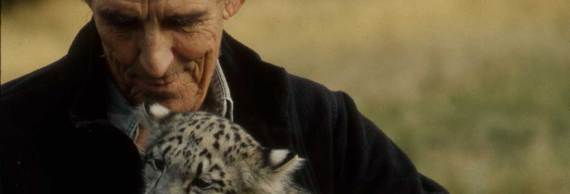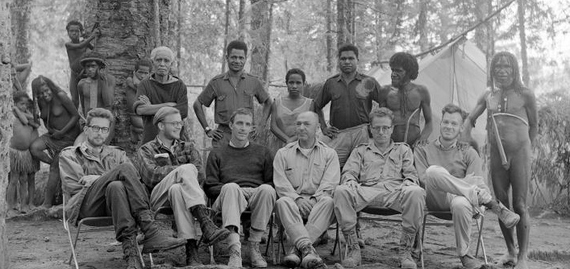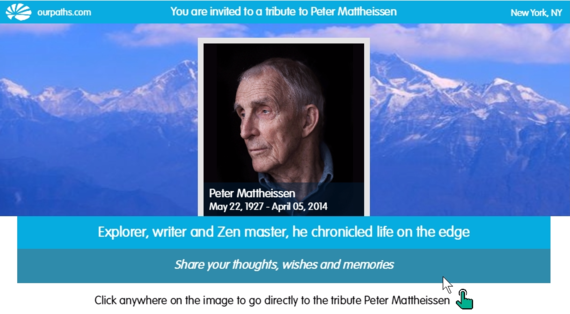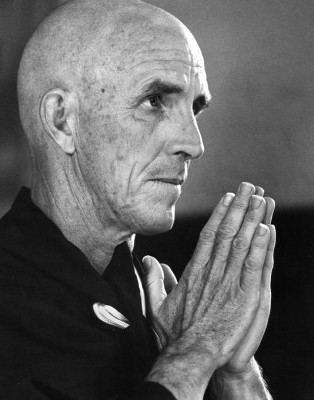Peter Matthiessen's life and work spanned continents, cultures and controversies. A renowned historian, CIA spook and celebrated author, he is the only writer ever to win a National Book Award for Nonfiction ("The Snow Leopard," 1979) as well as for Fiction ("Shadow Country," 2008).
Many writers consider Mattheissen one of the finest practitioners of the craft in the last half-century. Born into the East Coast establishment, Matthiessen ran from it, and in the running became a novelist, a C.I.A. agent, a founder of The Paris Review, author of more than 30 books, a naturalist, an activist and a master in one of the most respected lineages in Zen.
As early as 1978, The New York Times referred to him as a "throwback," because he always seemed to be of a different, earlier era, with universal, spiritual and essentially timeless concerns.
Mattheissen was born in New York 89 years ago this week. He studied at Yale and at the Sorbonne in Paris, and in 1951 he co-founded "The Paris Review." His early novels didn't sell well, and Matthiessen returned to New York and worked as a commercial fisherman until the late 1950s, when he began writing non-fiction for magazines.

Mattheisen with a snow leopard kitten. Mountain Magazine photo
He traveled and published the book Wildlife in America in 1959. His lifelong interest in ornithology informed much of his life's work. By the time of his death, Matthiessen was recognized as one of America's best nature writers, but his real love was fiction.
His non-fiction books included "Cloud Forest: A Chronicle of the South American Wilderness," (1961) and "In the Spirit of Crazy Horse," (1983) and "Blue Meridian: The Search for the Great White Shark,"(1971). His novels include "Far Tortuga," (1975), "In Paradise," (2014) and "Shadow Country," a combination of his Watson Trilogy -- "Killing Mr. Watson," (1990), "Lost Man's River," (1997) and "Bone by Bone," (1999) -- that won the National Book Award in 2008.
"I like to be out there on the edge with people who, as I say somewhere, haven't got time to be neurotic," he once said.
His work inspires reverence from other writers. Naturalist and writer Rick Bass describes Mattheissen as "one of my greatest literary heroes. Like so few writers in the world, the quality of his work has been matched by the extraordinary length of his career. The older he gets, the better he gets, and he started out very good. The breadth of his mind--his curiosities and passions--has led him to wildly different subjects, in fiction and nonfiction, with the result that wonderfully varied tribes of readers claim him as their own."
Perhaps that's what attracted him to the fraught topics of some of his books: "At Play in the Fields of the Lord," for instance, which focused on clashes between religions and government in the Amazon jungle and prominently featured the use of the hallucinogen Ayahuasca, or 1983's "In the Spirit of Crazy Horse," which detailed the FBI's attacks on the American Indian Movement at Wounded Knee, South Dakota.

Exploring Papua New Guinea, 1961. Mattheissen is third from left. Second from left is Michael Rockefeller, a videographer on the expedition who never returned. Photo by Eliot Elisofon, Peabody Museum, Harvard College.
A number of lawsuits followed the publication of "In the Spirit of Crazy Horse," which resulted in a decade-long delay for the book's paperback edition. He described the book as being "written for a cause."
"All of these advocacy books contain good stuff," he said, "but I had to work on them especially hard because, from a literary point of view, they came from the wrong place."
Matthiessen explained to "The Paris Review" what it is like to work both sides of the fiction / nonfiction divide:
"I am a writer. A fiction writer who also writes nonfiction on behalf of socialand environmental causes or journals about expeditions to wild places. I have written more books of nonfiction because my fiction is an exploratory process -- not laborious, merely long and slow and getting slower."
He was passionate about his Zen practice:
"I've been a Zen master for nearly 50 years. I had Japanese teachers for a long time and then a terrific teacher named Bernard Glassman, who is probably the most respected Zen teacher in America. And he started working with poor people, people with AIDS, people who were discriminated against, as part of our practice. We started these street retreats. We purposely chose people who were really up against it, most in need of help, so that took us into the shelters, flophouses. And finally it just seemed that the only way to really do this was to live on the street."
"We started in New York. And we wouldn't shave, put on old clothes. We didn't fool anyone for a second, but they appreciated the effort. And what they really appreciated was that we wanted to look 'em in the eye like this and talk to them, as if they were people and not some stuff on the sidewalk. I remember I heard a woman say, 'You know what we are to you people?' She said, 'We are like a piece of Kleenex that somebody's blown their nose into and thrown on the rainy sidewalk. Who wants to pick that up?'
"So we began with that and now Bernie has this organization called Zen Peacemakers and they go to troubled spots all over the world. We went to South Africa, Rwanda, Palestine, Israel."
Little is known of his work for the CIA. He was apparently recruited by the CIA during his time at Yale and continued working for the agency during the Paris Review period. This has been documented and acknowledged but never explained by Mattheissen.
Said James Salter in a remembrance for the "New Yorker,"
"There were aspects of Peter that faced elsewhere -- his spiritual life, his solitary travels, the intimate side of his past, that you knew only by chance or from reading his books."
OurPaths is a virtual scrapbook for collecting life stories. Build your own at OurPaths.com.
SOURCES:
- "At Play in the Fields of the Lord" by Peter Mattheisen
- Smithsonian.org
- Paris Review
- Salon.com
- Signature.com
- Background photo of Himalayas - Audubon.org
- Peabody Museum, Harvard


